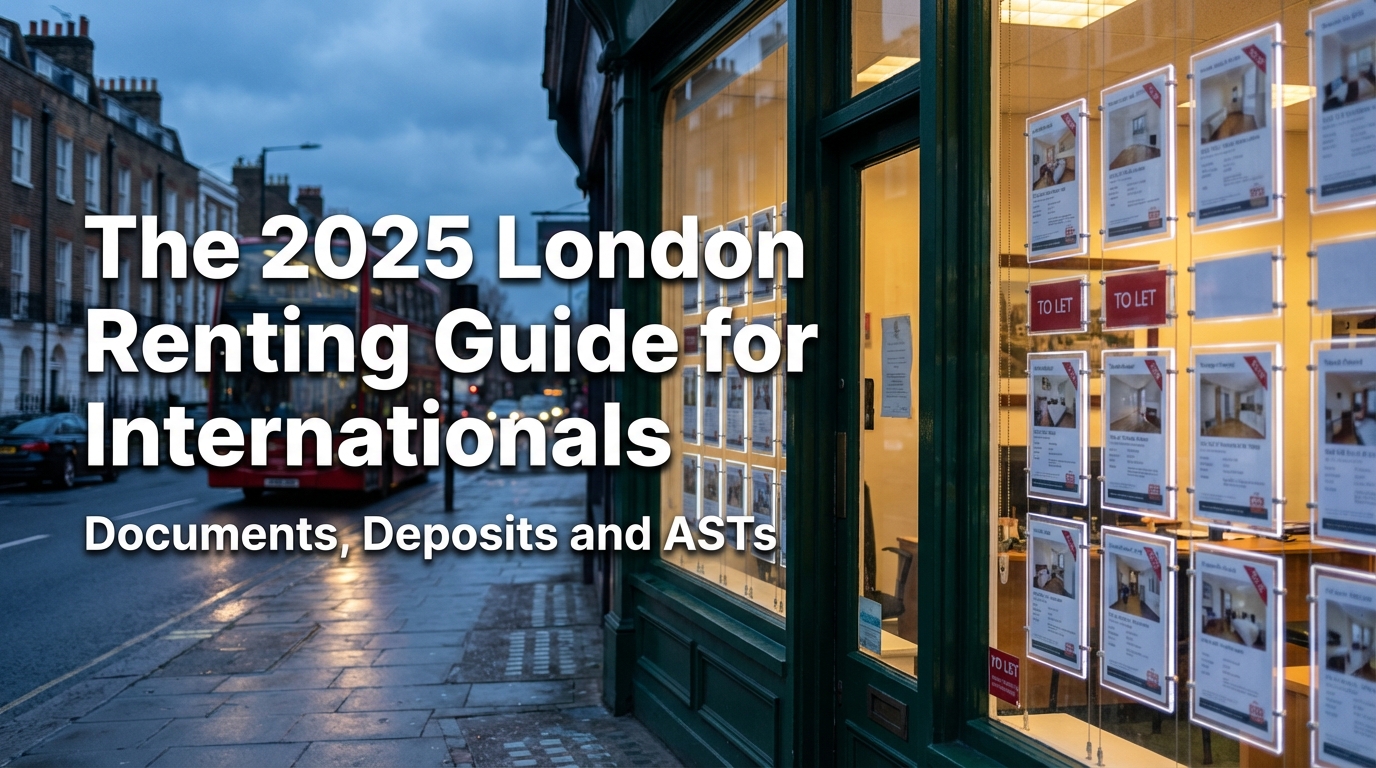The 2025 London Renting Guide for Internationals: Documents, Referencing, Deposits and ASTs

New to London? This practical guide walks you through the paperwork, checks and decisions you’ll meet between first viewing and move‑in.
Tip: Keep clear scans/photos of all documents in a single cloud folder. Agents move fast; having everything ready helps you secure the place you want.
Quick snapshot
- Right to Rent: digital share code (if applicable) or passport/visa
- Referencing: income proof OR student status + alternative evidence
- Deposit: legally capped (usually 5 weeks’ rent) and must be protected
- Contract: most tenancies are ASTs (Assured Shorthold Tenancies)
- Keys: never pay or collect keys before you see and sign the AST
Required documents (Right to Rent)
In England, landlords/agents must check a tenant’s “Right to Rent.”
- UK/Irish citizens: passport or other accepted documents
- Visa holders: generate a digital share code for landlords: https://www.gov.uk/prove-right-to-rent
- Students: CAS/Letter of enrolment may be requested (in addition to Right to Rent)
- Address proof: initial address proof can be tricky; see bank/set‑up tips in our checklist post
If you cannot be present, ask how remote checks are handled (video call; certified copies; agent’s policy).
Referencing without a UK credit history
Many internationals won’t have a UK credit file. You still have options:
- Income verification: offer letter/contract, recent payslips, employer reference
- Student route: enrolment confirmation, scholarship/maintenance evidence, guarantor or alternative support
- Bank statements or open banking: show affordability and regular income
- Savings evidence: show funds covering 6–12 months of rent
- Previous landlord reference: from your last country
If a traditional guarantor is required but you don’t have one, see our guide: Rent in London without a UK guarantor.
Deposits, holding deposits and protection
- Holding deposit: usually up to 1 week’s rent to reserve a property (deducted from first rent/deposit if you proceed). Ask for written terms and timelines.
- Tenancy deposit cap: under the Tenant Fees Act, deposits are capped at 5 weeks’ rent (6 weeks if annual rent > £50,000).
- Deposit protection: landlords/agents must protect deposits in an approved scheme (DPS, TDS or MyDeposits) and share prescribed information.
- Inventory: ensure a dated, photo‑rich inventory at check‑in. Disputes hinge on evidence.
AST basics (Assured Shorthold Tenancy)
- Term: commonly 6–12 months fixed; some offer break clauses (e.g., 6‑month break in a 12‑month term)
- Names on contract: anyone living there and paying rent should be named (important for HMOs/house shares)
- Bills: clarify what’s included (council tax, energy, water, internet)
- Renewals: rolling periodic tenancy vs renewal fee/term – ask early
Read the full AST. Query clauses about fees, professional cleaning, subletting, guest stays, and early termination.
Viewings, red flags and scams
- Never transfer rent or deposit to a private account with no contract
- Be wary of deals that skip viewings “because demand is high”
- Keys only after you sign the AST and payment is receipted
- For HMOs (house shares), ask about licensing and safety certificates
Costs to plan for (guide only)
- Upfront: holding deposit, first month’s rent, tenancy deposit
- Recurring: rent, council tax (students may be exempt), utilities, internet, TV Licence
- Moving: furniture, kitchen/small appliances, bedding, insurance
See our deep‑dive: Council Tax and bills in London.
Useful official links
- Right to Rent: https://www.gov.uk/check-tenant-right-to-rent-documents
- Prove your Right to Rent (share code): https://www.gov.uk/prove-right-to-rent
- Deposit protection (DPS/TDS/MyDeposits): https://www.gov.uk/tenancy-deposit-protection
Get Approved to Rent Today
No UK guarantor? CasaPay provides instant rent guarantee so you can move in with just one month's rent—no 6-month upfront payment, no international guarantor needed.
Trusted by 10,000+ students at UK universities
- ✅ 5-minute approval
- ✅ Accepted by major London agents
- ✅ Move in faster
Download CasaPay → Available on iOS and Android
What next?
- Compare areas by commute and budget: Neighborhoods playbook
- No UK guarantor? Options explained: 7 proven paths
- Getting set up in week one: Expat setup checklist
Disclaimer: This guide is for general information in 2025. Policies and prices change; always check current rules on GOV.UK and with your agent/landlord.
Useful links
- https://www.gov.uk/prove-right-to-rent (gov.uk)
- https://www.gov.uk/check-tenant-right-to-rent-documents (gov.uk)
- https://www.gov.uk/tenancy-deposit-protection (gov.uk)
- iOS (apps.apple.com)
- Android (play.google.com)